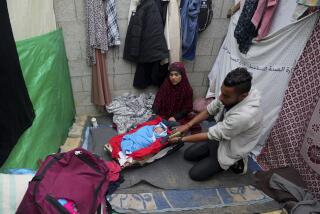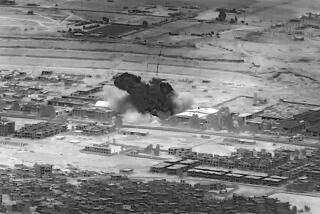U.S. Targets ‘Death Squads’ in Iraq
- Share via
BAGHDAD — U.S. military officials announced Monday that they had stepped up a campaign against “death squads” operating in the capital, launching 19 raids as sectarian violence between Sunnis and Shiites left dozens dead and wounded throughout Iraq.
In the western Iraqi province of Al Anbar, two U.S. soldiers died in combat, and the mayor of the provincial capital was assassinated.
For the record:
12:00 a.m. July 31, 2006 For The Record
Los Angeles Times Monday July 31, 2006 Home Edition Main News Part A Page 2 National Desk 3 inches; 57 words Type of Material: Correction
Iraqi officials: An article about Iraq’s so-called death squads in July 25’s Section A gave the wrong title for Mohammed Ahmed Dulami, who was assassinated July 23. He was a ranking municipal official in Ramadi, not the mayor. Also, Mohammed Shibeeb, identified in the story as a police officer, is no longer in the Ramadi security forces.
Inside the heavily protected Green Zone, former President Saddam Hussein’s half brother presented his final defense in a trial over the fate of nearly 150 Shiite Muslim villagers allegedly killed by the former regime.
Army Maj. Gen. William B. Caldwell IV, the top U.S. military spokesman in Baghdad, said the 19 raids were part of an effort to control the violence that has engulfed Baghdad in recent weeks. “Over the last week, we have intensified ... our efforts against death squads,” he said.
The military said it had captured eight cell leaders and 37 cell members, but refused to specify whether they were members of Sunni or Shiite groups.
Meanwhile, Iraqi Prime Minister Nouri Maliki, a former Shiite activist, made his first official visit to Britain since his government was formed in May.
In London, he acknowledged the violence between Shiite militiamen and Sunni insurgents, but insisted that his government was able to control the situation. “There is a sectarian issue, but the political leaders have succeeded, and they are working on putting an end to the sectarian issue,” he told the BBC before meeting with British Prime Minister Tony Blair. “There are continuing efforts in that direction; civil war will not happen in Iraq.”
Maliki was scheduled to travel to Washington today, amid talk of committing additional U.S. troops to Baghdad.
He refused to say Monday how long a foreign military presence might be needed in Iraq, but said “definitely not decades, not even years.”
“I think, in this visit, we will discuss issues that will enable foreign troops to leave,” he told the BBC. “There are certain aspects in our local forces that need development. When that happens, foreign troops can start leaving.”
Iraq’s sectarian violence has prevented a serious troop drawdown and U.S. troops continue to die in combat.
The U.S. military announced Monday that two soldiers assigned to the 1st Brigade, 1st Armored Division, based in Ramadi, had been killed.
Although the military released no more details, a witness reported that a roadside bomb had exploded near a Humvee at about 5 p.m. on Monday, apparently killing the soldiers.
Four civilians were killed during a clash between an American military patrol and gunmen Monday afternoon, Ramadi Police Lt. Mohammed Shibeeb said. Violence has intensified in Ramadi in the last two days, killing five policemen and the mayor, Shibeeb said.
The mayor of Ramadi, Mohammed Ahmed Dulami, was killed around 9 p.m. on Sunday by a group of gunmen, according to a witness. Three policemen were also killed in the attack.
In two separate incidents in Baghdad’s Dora neighborhood Monday afternoon, gunmen killed an official in the Ministry of Electricity and shot a civilian. In northern Baghdad, four bodies were found, all of people killed execution-style. Three other bodies of Sunnis shot in the head were found behind a factory in Taji, just north of Baghdad.
In addition, three civilians were killed and 20 others were injured in mortar attacks in southern and western Baghdad. And a clash between police and gunmen killed one police officer and injured six Iraqis in downtown Baghdad.
Iraqi security forces were also targeted in two separate roadside bombings that left one civilian dead and injured two Iraqi soldiers and two police officers.
Caldwell, the U.S. military spokesman, insisted, despite the increase in violence in Baghdad, that most of Iraq remained relatively stable and peaceful.
“If you look throughout the rest of Iraq, you don’t see that density,” he said, speaking of the number of civilian deaths in the capital. “Baghdad is the center that everybody is fighting for.”
But other major cities were not quiet Monday.
A suicide car bomb exploded in the eastern part of the northern city of Mosul, killing five Iraqis and injuring four more. Two people were found dead of gunshot wounds in western Mosul, and a member of the Turkmen Iraqi Front, a political party representing the Turkmen minority, was assassinated along with three of his bodyguards.
A car bomb also exploded in Samarra, 70 miles north of Baghdad, killing two people and injuring 11 others.
In the southern city of Basra, British forces moved against members of the Al Mahdi militia, detaining nine men and angering residents loyal to radical cleric Muqtada Sadr, an official from Sadr’s Basra office said.
Final defense arguments in the trial of Hussein and seven co-defendants on human rights charges stemming from alleged reprisals against Shiite villagers in the town of Dujayl resumed today, even with the former president in the hospital and lawyers for the defense continuing a boycott of court sessions.
Hussein, on a weeks-long hunger strike to protest conditions for the defense, was hospitalized and voluntarily fed from a tube Sunday, a U.S. military official said.
In the heavily protected courtroom Monday, Barzan Ibrahim Hasan, Hussein’s half brother and former head of Iraqi intelligence, argued against the legitimacy of the Iraqi court and accused his court-appointed attorney of shaking down his relatives for $7,500 to properly defend him.
Hasan is accused of taking part in the detention, torture, banishment and execution of innocent villagers caught up in a campaign of retribution after a failed 1982 assassination attempt on Hussein. Hasan has denied any part in the alleged events, but justified actions such as destroying the villagers’ centuries-old gardens and orchards.
“The orchards of Dujayl were shelters for bad people and members of the Dawa Party,” he said, referring to Maliki’s then-outlawed Islamic political organization.
At one point, Hasan launched into a speech in support of the Iraqi insurgency. Judge Raouf Rasheed Abdel Rahman quickly interrupted.
“Is this a defense or are you asking people to kill Iraqi people?” he said to Hasan. “You’re using this time to induce others to kill Iraqis and destroy Iraq.”
“Since you were a child, you’ve been drowned in blood,” the judge said. “Get to the subject or I’ll close the session.”
The trial, televised with a 20-minute delay, once mesmerized Iraqis but has now been eclipsed by news reports from the Middle East as well as increasingly popular cooking shows. It adjourned until Wednesday.
Times staff writer Kim Murphy in London and special correspondents in Basra, Mosul, Ramadi and Samarra contributed to this report.
More to Read
Sign up for Essential California
The most important California stories and recommendations in your inbox every morning.
You may occasionally receive promotional content from the Los Angeles Times.









